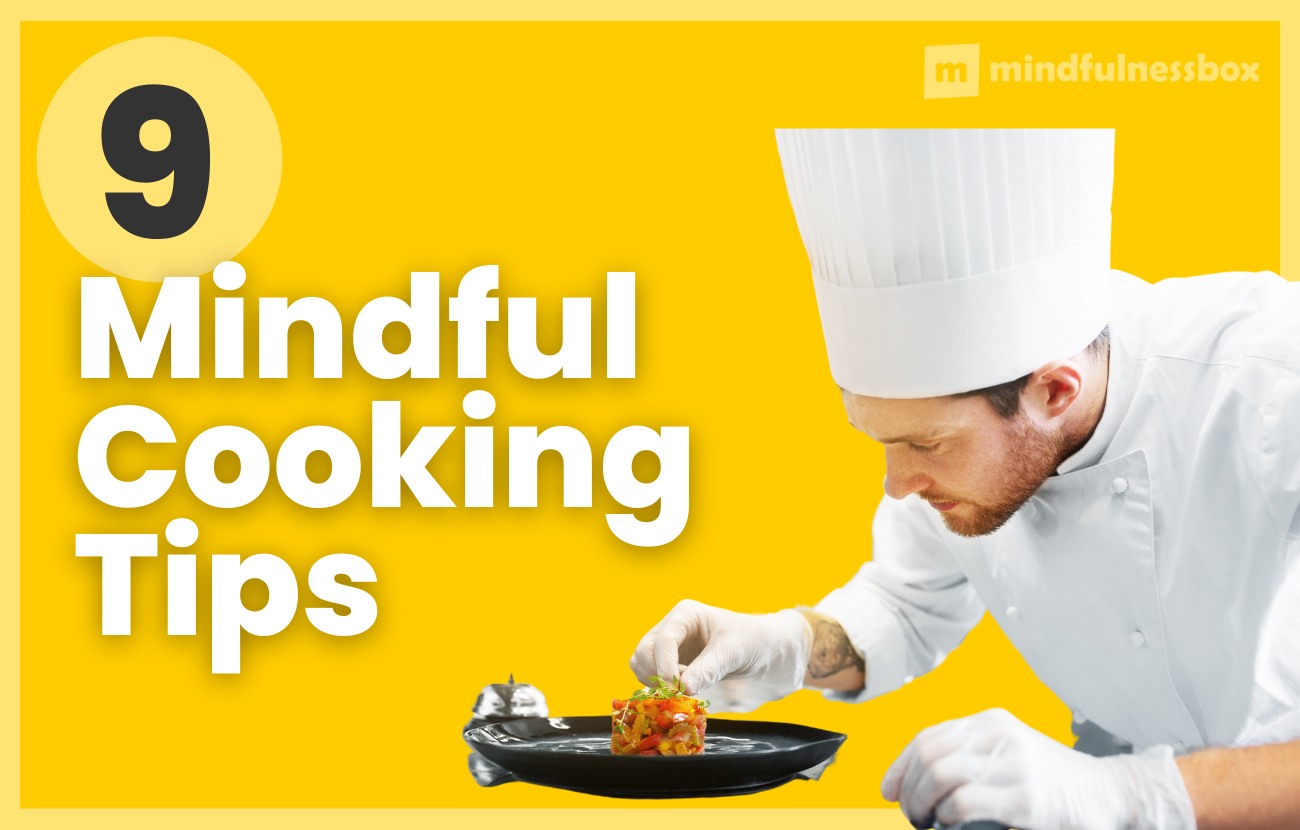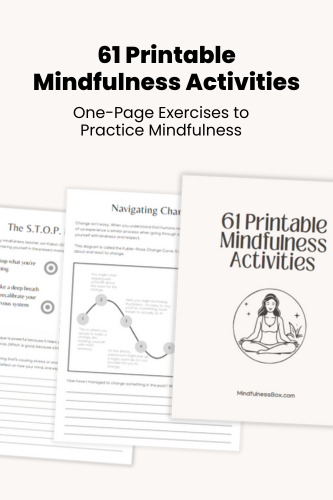Mindful cooking, also known as cooking meditation, is the art of cooking with patience, curiosity, and nonjudgment, while paying attention to smells and flavors. When you’re cooking mindfully, you treat cooking as if it were a meditation by approaching each action with intention, rather than rushing through it.
I’ll be honest – cooking is often stressful for me.
Don’t get me wrong! I love to cook: the creativity of it, the ability to feed people I love – the whole process.
Get dozens of one-page exercises to help practice mindfulness, meditation, gratitude, and self love. Perfect for printable handouts when teaching mindfulness to groups, students, or in the workplace.
To see examples, plus a full list of the 61 exercises included, click below.
But I’m a born single-tasker. Juggling many activities at once makes me feel overwhelmed. When there’s three pans on the stove, veggies roasting in the oven, ingredients still needing to be chopped, dogs underfoot, and cooking timers going off – often, the magic of cooking gives way to stress.
That’s why thinking about mindful cooking strategies is interesting to me. What can we do to protect the joy and creativity of cooking, while making sure we don’t rush through the process?
Let’s explore what cooking with intention looks like, and walk through specific strategies you can use to create a more conscious cooking experience.
The philosophy of cooking meditation
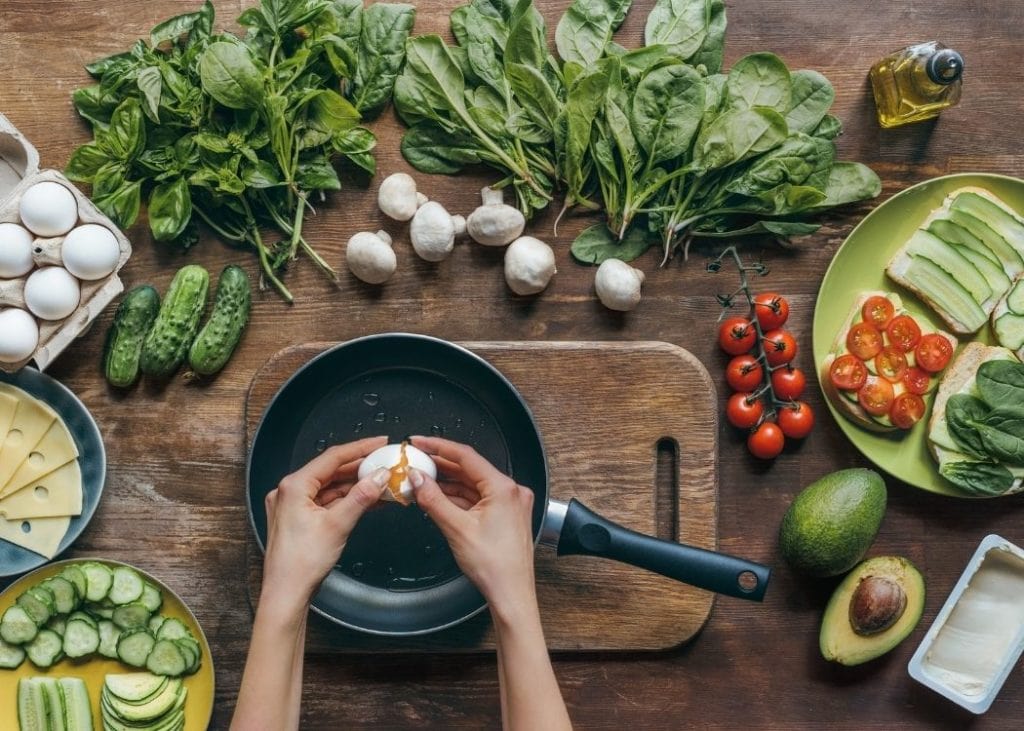
Cooking meditation is simply mindfulness and meditation in action.
When you’re sitting on a cushion, practicing meditation, you’re not practicing the art of sitting on a cushion. What you’re really training are your powers of attention.
Mindful cooking is a chance to put those powers of attention into action. If you’re able to take every cooking session as an opportunity to stay present, stay curious, and stay nonjudgmentally aware of the sensations around you – you’re practicing cooking meditating.
The best way to get started with cooking meditation is to approach the cooking experience with intention.
Okay – I know this sounds like generic advice, so let me explain what I mean.
What’s your experience when you normally enter the kitchen to make dinner? Maybe you look in the fridge to see what’s available, or pull up a recipe to make an old favorite? Either way, if you’re like me, you probably have one goal in mind:
To get the meal cooked as quickly as possible.
“Cooking as meditation” invites us to approach this activity by focusing on the process, instead of the outcome. If you’re cooking mindfully, your goal shifts:
To approach cooking with as much joy, creativity, curiosity, present awareness, and nonjudgment as possible.
That’s it.
As long as you’re approaching cooking meditation with that intention, everything else will follow naturally.
The benefits of mindful cooking
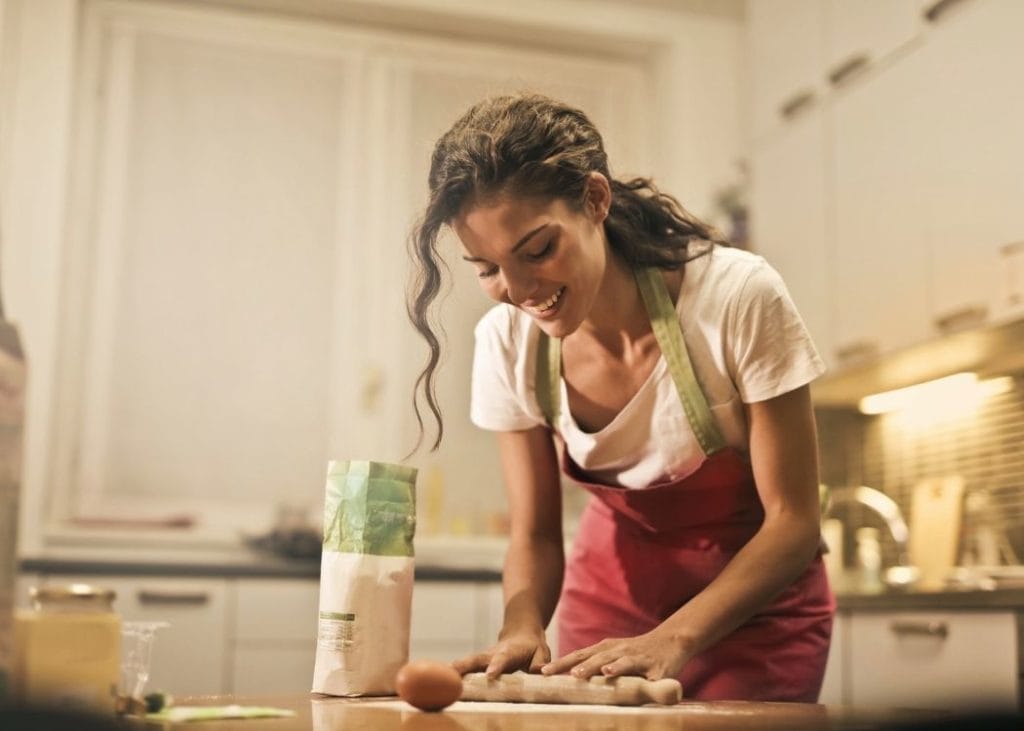
My reason for exploring mindful cooking comes from the realization that oftentimes, my experience of cooking isn’t what it could be.
Rather than feeling satisfied, stimulated, and relaxed while cooking a meal, I’m often frustrated. It starts to feel like there’s too much to manage. Plus, I’m attached to the idea that everything needs to be perfect, or that the outcome should exactly match the initial idea I had.
That feeling is no fun! Especially given the fact that we cook for hours each week. That’s a lot of time in “frustration mode” when it could be spent in enjoyment.
Mindfulness cooking, for me, is a way to slow down and focus on the enjoyment of the cooking process, rather than getting caught up in the outcome I had in mind, or the problems I face along the way.
Here are just a few of the skills you’re developing through cooking meditation:
- Acceptance: Sometimes (okay, often) a meal doesn’t turn out how you imagined it. Rather than fixating on the fact that the meal isn’t perfect, mindful cooking challenges you to accept the outcome.
- Creativity: Cooking is inherently about creating something new. Each time you enter the kitchen and start to gather ingredients, remind yourself: you’ve probably never made anything with exactly this mixture of ingredients, cooking time, spices, sauces, and temperature before. Celebrate that!
- Patience: To practice mindful cooking, you need to go slower. We all love those “Best meals you can make in under 15 minutes” recipes. But mindful cooking is simply going to take a bit more time, so you have time to pay attention to each step of what you’re doing. This builds patience.
- Curiosity: This is a big one. Remember: the kitchen is a creative playground, and there are no rules for what you can and can’t do with food. Cooking meditation invites you to slow down and consider each step of what you’re doing. As you start to ask yourself questions (“I wonder if this would go well with that?…”) your curiosity muscle strengthens.
- Nonjudgment: One of the key challenges of any mindfulness practice is judgment. Self-criticism and judgment are common human experiences, and one way they might show up is in your first cooking meditation session. It’ll be easy to berate yourself for intending to approach cooking more mindfully, only to find yourself just as stressed as always. That’s normal! Over time, you’ll learn to practice nonjudgment and release yourself from expectations. This is especially when you’re learning something new.
- Flexibility: Cooking is a dynamic process, and recipes sometimes go sideways in the middle of cooking. That’s part of what makes cooking so interesting and creative! When this happens, a mindful cooking approach sees it as an opportunity to adapt. Making changes on the fly when cooking teaches flexibility.
- Focus: When there are a dozen things that deserve your attention, as in cooking, giving your full attention to just one of them is an act of determination. However, it makes the experience richer. If you can truly focus on chopping carrots, approaching the act with curiosity and acceptance that it will take the time it takes, you’re growing your powers of focus.
9 mindful cooking tips
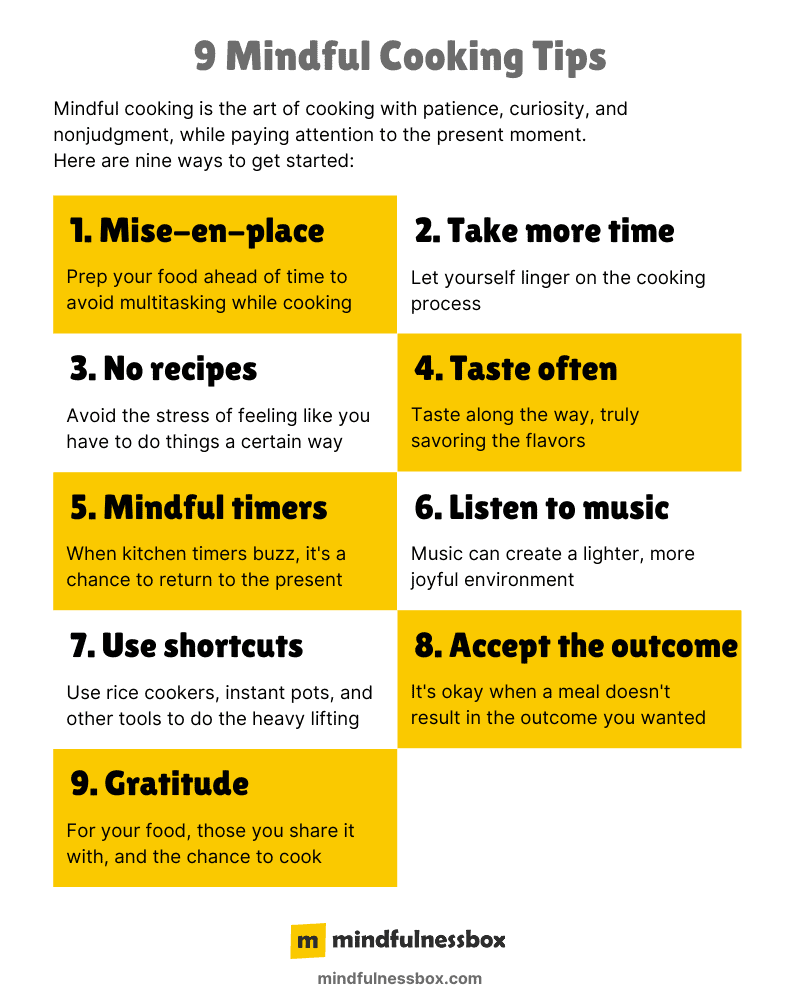
So far, we’ve focused on the philosophy of mindful cooking, and its benefits. But as useful as those principles are, sometimes you need concrete practices that help set the stage for success.
Here are nine strategies that can help you create a more mindful, less stressful cooking experience.
1. Mise-en-place
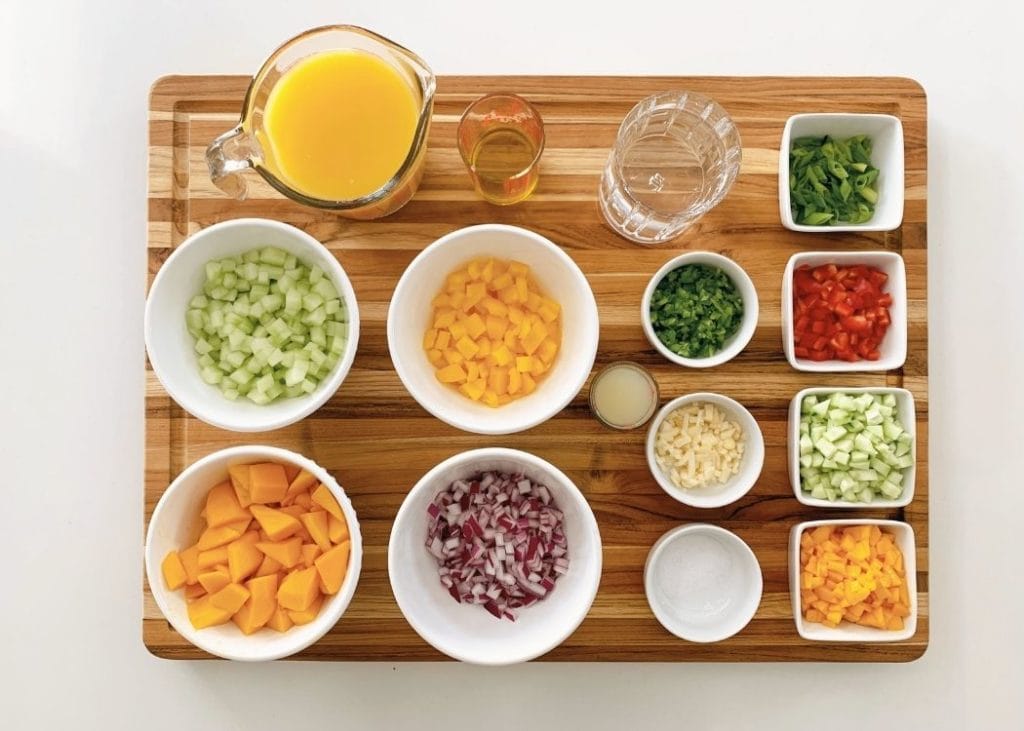
Mise-en-place is a French word that’s often used in a kitchen context for food preparation.
Have you ever done 100% of your chopping and prep work before turning on the oven or putting oil in a pan?
That’s mise-en-place. If you’re allergic to multitasking like I am, it makes the cooking experience much more pleasant. Plus, it makes it much easier to focus on one thing at a time. Rather than chopping carrots while you make sure the onions and garlic don’t burn, now, you’re just chopping carrots.
To practice this technique, just clean and chop all your ingredients beforehand, putting them into small bowls so they can be easily tossed into the pan at the right time. You can even do so with your spices and oils, too, if you want to get extra-precise.
2. Take more time
It’s hard to be mindful of your cooking experience if you have too much to do and too little time. See if you can start your cooking process a bit earlier to create more time to linger on your cooking experience, rather than rushing through it.
If you’re short on time, meal prep is your friend. If you plan out your recipes in advance and do the chopping and prep work in bulk ahead of time, mindful cooking gets easier. Once you’ve done your meal prep, you have way less to focus on when it comes time to cook, so you’ll be less rushed. You can just grab your pre-cut ingredients from the fridge and from there, pay mindful attention to the process of cooking.
3. Don’t follow a recipe
This may just be a personal preference of mine. Recipes stress me out. I like to look at them for inspiration, but if I try to follow one to the letter while cooking, the whole process becomes more stressful. I also open myself up to less confidence (“Am I doing that right?”) and less creativity (“Ooh, the recipe doesn’t call for that. Maybe I won’t add it.”)
If you’re normally a recipe-follower, try going into the kitchen with a general idea of what you want to create instead. Open yourself up to the outcome, and see what happens.
4. Taste along the way
This goes without saying, right? One of the joys of cooking is that you can eat a little bit here and there as you prep. Also, tasting along the way is important to creating a flavor outcome you’re happy with.
Tasting along the way isn’t only important for good flavor; it’s the cooking equivalent of stopping to smell the roses. Make sure to enjoy your creation the whole time, not just once you serve it. As you eat a little here and there, challenge yourself to truly stop to savor the flavors you’re experiencing.
5. Use kitchen timers as mindfulness reminders
The sound of kitchen timers going off isn’t my favorite. (They’re never especially gentle sounds, are they?)
But in our case, we can give them a dual purpose: in addition to telling you when portions of your ingredients are done cooking, timers can also serve as a mindfulness reminder. Even though you entered the kitchen with the intention of cooking more mindfully, it’s entirely possible that you may have forgotten to pay mindful attention to what you’re doing. Timers can help pull you back to the present moment.
6. Use music to create a more playful atmosphere
Whether or not to put on music while you’re cooking is a personal preference, but when it comes to creating an atmosphere conducive to mindfulness, I think it helps.
That’s because, at least to my mind, music means “we’re going to have fun and enjoy cooking as an activity” whereas no music means I’ll approach cooking as more of a necessity, rather than a pleasure.
7. Embrace ways to make cooking easier
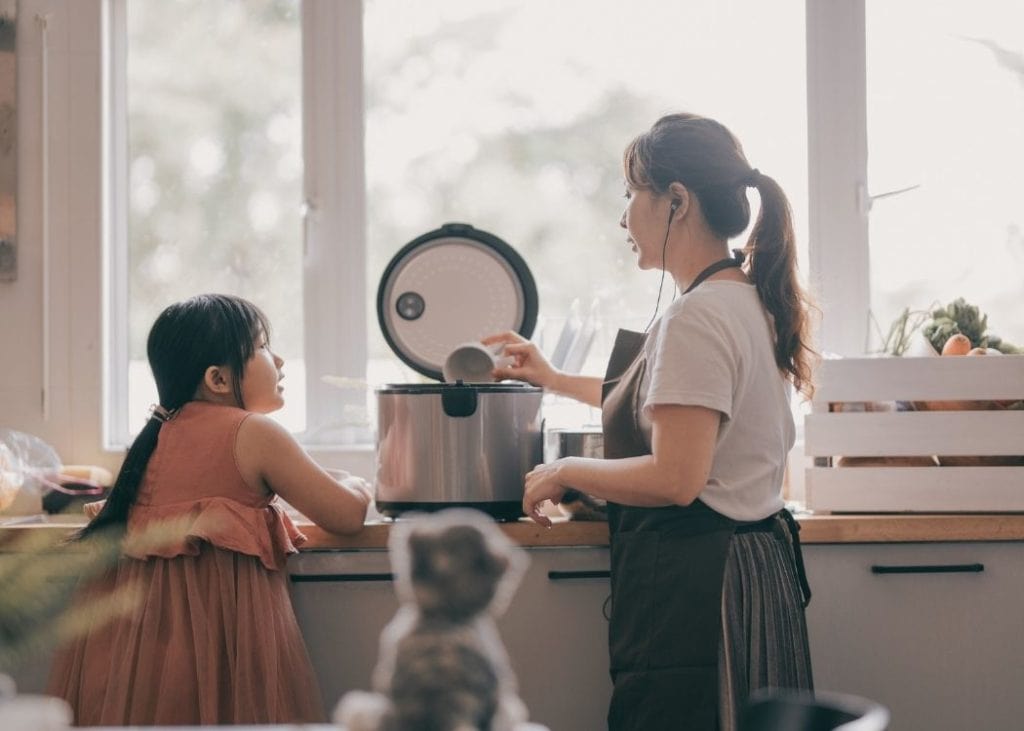
I’m a rice cooker evangelist (I mean seriously – have you ever tried one?), so take this with a grain of salt, but:
Rice cookers might change your life.
There are few kitchen tools like this that can help you “set and forget” elements of the cooking experience, which in turn, creates less multitasking and gives you more time to linger on elements of the cooking process that do need to be done by hand.
I also find that using the oven tends to be easier than juggling three or four pans on the stovetop burners, each with oil and ingredients and different cooking times. It’s a lot to manage!
When possible, try preheating the oven while you do your mise-en-place, then throwing all your ingredients in there to roast. Check in every 15-20 minutes to see what needs to be flipped or moved closer to the heating elements.
I hear good things about slow cookers and instant pots too.
8. Accept the outcome
This is tough, but necessary.
A lot of times, cooking doesn’t go your way. You end up oversalting everything, or half the ingredients get burnt, or everything falls apart just as you serve it (been there).
Cooking is all about experimentation and creativity, and each of those experiences get filed away into your brain, building your cooking instincts over time.
But more importantly, practicing acceptance of the outcome in cooking is practice for accepting other outcomes in life.
9. Be grateful
You’ve finished your prep and your cooking and you’re about to serve the food onto plates. You made it!
Before you serve, take a moment to be grateful for the chance to bring more joy and curiosity to this daily activity.
You’re going to cook thousands of meals over the course of your life. If you’re able to crack the code on bringing more mindfulness to your cooking experience, you’ll be swapping hundreds of hours of stress and frustration for creativity and enjoyment.
If that isn’t something to be grateful for, I don’t know what is.
Getting started with mindful cooking
So, you’re ready to embark on your first mindful adventure.
But where should you start?
Drawing from the tips and philosophies above, here’s the game plan I’d recommend.
First, approach the cooking experience with an open mind and an intention to be light, joyful, creative, and aware of the present moment. Commit to being nonjudgmental of the outcome, whatever happens.
Second, make the cooking experience as easy as possible on yourself. Set yourself up for success by using shortcuts where you can, like rice cookers and instant pots. See if you can create “one-pan” meals or meals where everything roasts in the oven. Simplify some things so you can focus your full attention on others, rather than bouncing between tasks to make sure the kitchen doesn’t burn down.
Third, chop all your ingredients ahead of time (mise-en-place) and consider not using a recipe, especially if recipes make you feel like there’s only one “right” step-by-step way to cook.
If you’ve gone into mindful cooking with an attitude of openness and playfulness, made the cooking experience easy by chopping ahead of time and using cooking shortcuts, and prepared yourself to accept any outcome without judgment – you’ve cracked the mindful cooking code.
You’re now on your way to becoming a stress-free chef.

My mindfulness practice kicked off in 2016 with a ten-day silent retreat. Since then, I’ve read dozens of books about mindfulness and completed hundreds of hours of meditation. Thinking about what makes humans happy, calm, and peaceful is endlessly fascinating to me.

